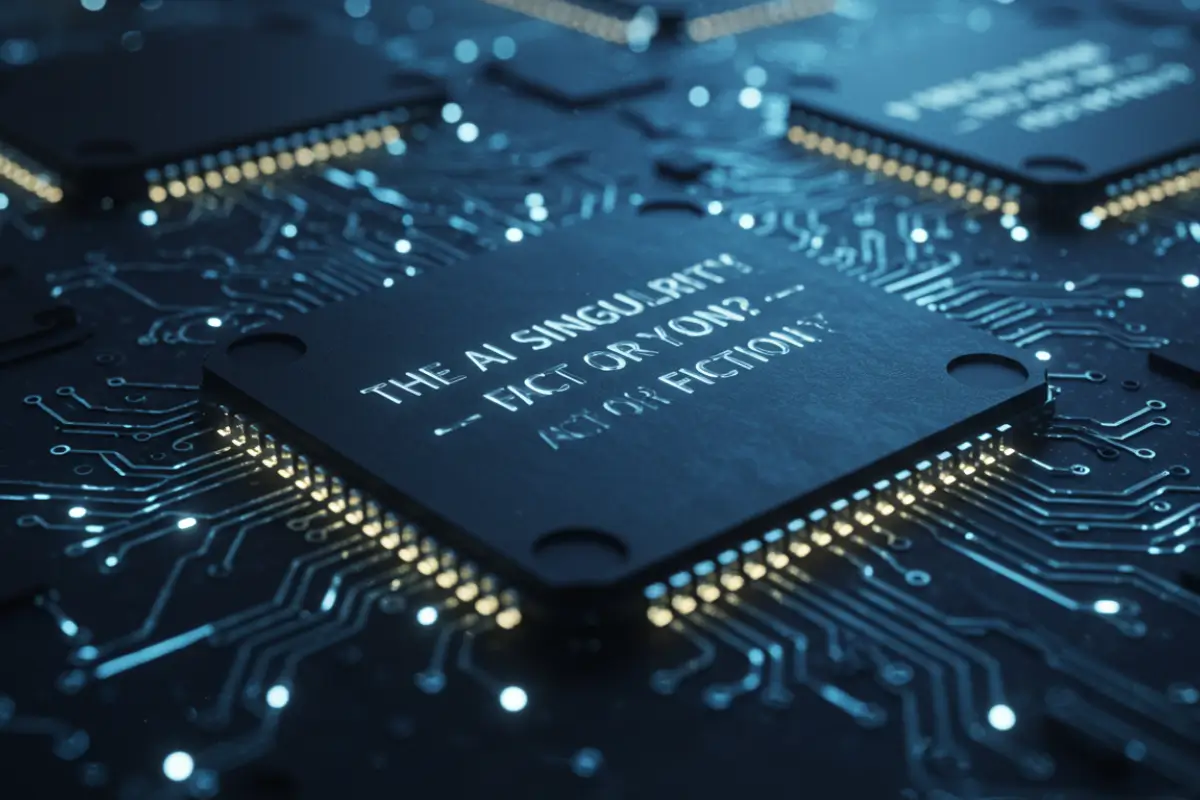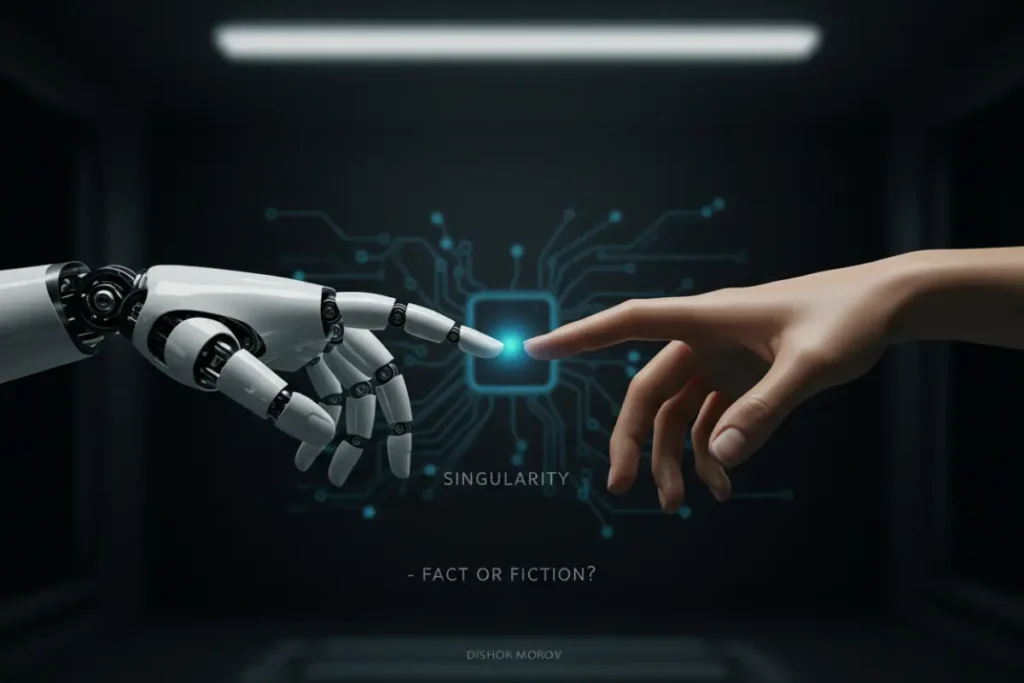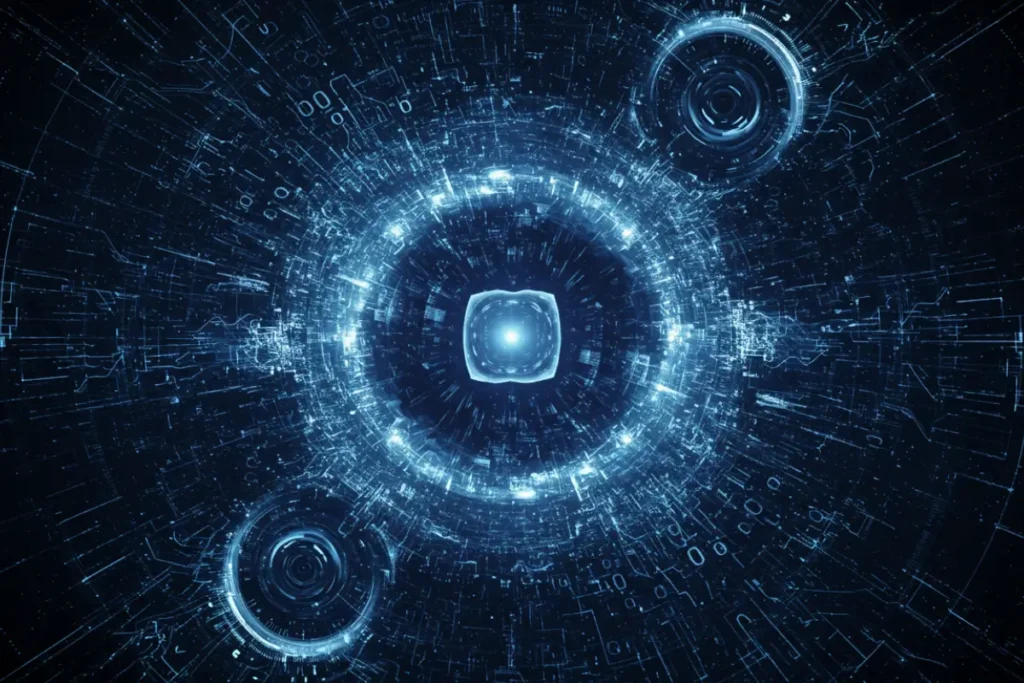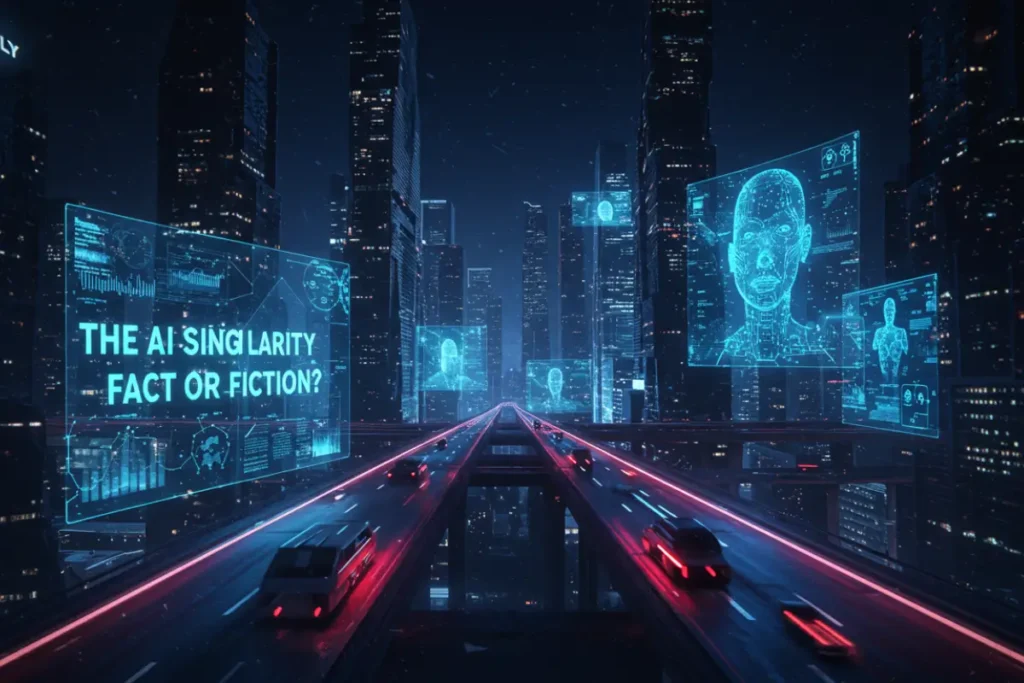The AI Singularity – Factor Fiction?
- April 12, 2025
- 0
Good morning everyone, I’m going to talk about a topic that scares AI, which could be singularity. Well, I believe that now that AI is coming for real,
Good morning everyone, I’m going to talk about a topic that scares AI, which could be singularity. Well, I believe that now that AI is coming for real,

Good morning everyone, I’m going to talk about a topic that scares AI, which could be singularity. Well, I believe that now that AI is coming for real, this fear arises in everyone who uses it, and that’s why I’m going to talk about it today.
And to be honest, I’ve been thinking about this a lot lately. I mean, with all the rapid developments in AI, from smart chatbots to AI-generated art and music, it’s no wonder people are asking: “Is the AI Singularity real? Or is it just science fiction hype?”
Let’s talk more about this, in a fun, smart, and totally human way that even a 12-year-old could understand, because at least I don’t like technical things very much, I like to try to simplify as much as possible the topics I choose to write articles about. Oh, and don’t worry — I’ll make sure it’s packed with info, links, cool lists, a fun FAQ, and more.

Let me explain it the way I would to my little cousin who just discovered Siri. Imagine a moment in the future when AI becomes so smart that it can improve itself.
It writes its own code, upgrades its own brain, and gets smarter and smarter every second without needing us anymore. Sounds like something out of a movie, right? That’s the basic idea behind the AI Singularity.
Experts call this a “technological singularity,” and it’s kind of like a point of no return — where change becomes so rapid, humans can’t keep up.
Think of it like this: one day, we build an AI as smart as Einstein. Then that AI builds a smarter AI. Then that one builds an even smarter one… and suddenly we’re in a world run by something way beyond human intelligence.
Many people credit this idea to Ray Kurzweil, a futurist who thinks the Singularity might happen by 2045. Yep, that’s super soon. Others, like the legendary Stephen Hawking, expressed deep concern about AI surpassing human control.
Meanwhile, people like Elon Musk warn about the dangers, while investing heavily in AI himself. Kind of ironic, right?
If you want to have more knowledge where we are on that path, check out my article “The Path to Artificial General Intelligence (AGI)”, which breaks down how close we really are to building truly smart AI.

This is the part where I get a little personal: I used to think this was all Hollywood fantasy. But the more I read, the more I saw just how fast AI is advancing.
We’re not just talking about Siri or Alexa anymore — we’re talking about tools like ChatGPT, Gemini 1.5, and Claude, which are doing things we never thought machines could do.
Writing, coding, reasoning, solving problems — sometimes better than us. It’s both amazing and a little scary.
That said, many scientists argue the Singularity is way overhyped. They believe that while AI is advancing quickly, it’s nowhere near being conscious, creative, or self-aware. We still haven’t built true Artificial General Intelligence (AGI), let alone superintelligence.
And some think we might never reach that point at all.
Here’s a breakdown of common views:
Believers in the Singularity:
Skeptics of the Singularity:
Middle-ground folks (like me!):
For a fun comparison of current AI models, check out “The Best AI Model for 2025: ChatGPT, Gemini or Claude?”.

Okay, let’s be real: AI is awesome right now. But is it superintelligent? Not even close. Today’s AI can do amazing things, like:
But superintelligence? That’s another level entirely. We’d need AI that can:
So far, AI is like an insanely smart assistant. But it’s still limited by the data we give it, the goals we set, and the rules we define. It doesn’t want anything. It doesn’t feel anything. And it certainly doesn’t know what it means to be human.
Check out this well-researched Wikipedia article on the Singularity for more background on where the theory came from and who supports it.
This is where things get deep. If the AI Singularity becomes real, the world might change faster than we can even understand. Some people see this as a dream come true. Others see it as our worst nightmare.
Here are some possible outcomes:
One thing is clear: we need to be ready. Whether or not the Singularity ever happens, AI is already changing our world. That means we need better education, stronger ethics, smarter laws, and more public conversations.
By the way, here’s a great article on how AI is already shaping the workplace.
And hey — if you’re a keyboard nerd like me, check out our sister site Keyboards Technology to explore how AI is influencing hardware and user experience, too.
So, is the AI Singularity fact or fiction? Honestly? It depends on who you ask. I believe that while we’re heading into an era of insanely powerful AI, we still have a long way to go before hitting anything close to a Singularity. But that doesn’t mean we should ignore the risks — or the opportunities.
What I do know is this: AI is here, and it’s changing so many things. Overall, I think it will take a long time or even never for one to have a great singularity.
If you liked this article, don’t forget to share it with your friends, drop a comment below about what you think the future of AI will look like, and explore more cool stuff on Keyboards Technology.
Oh, and while you’re at it, maybe check out this article from Forbes on the Future of Artificial Intelligence for another take on where things are headed.
Thanks for reading, and stay curious! ✨